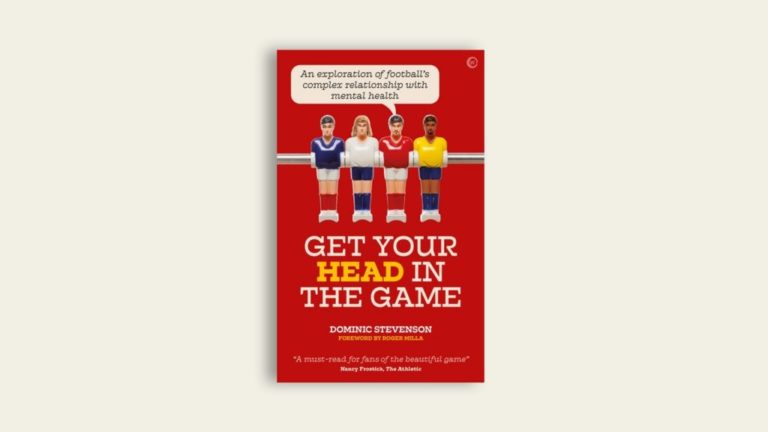
In Mental Health Awareness Week, the author of ‘Get Your Head In The Game’ talks to Sports Media LGBT+ about the conversations he had with LGBT+ people in football for his book, and how the sport he loves could do more to shift mindsets towards greater inclusion…
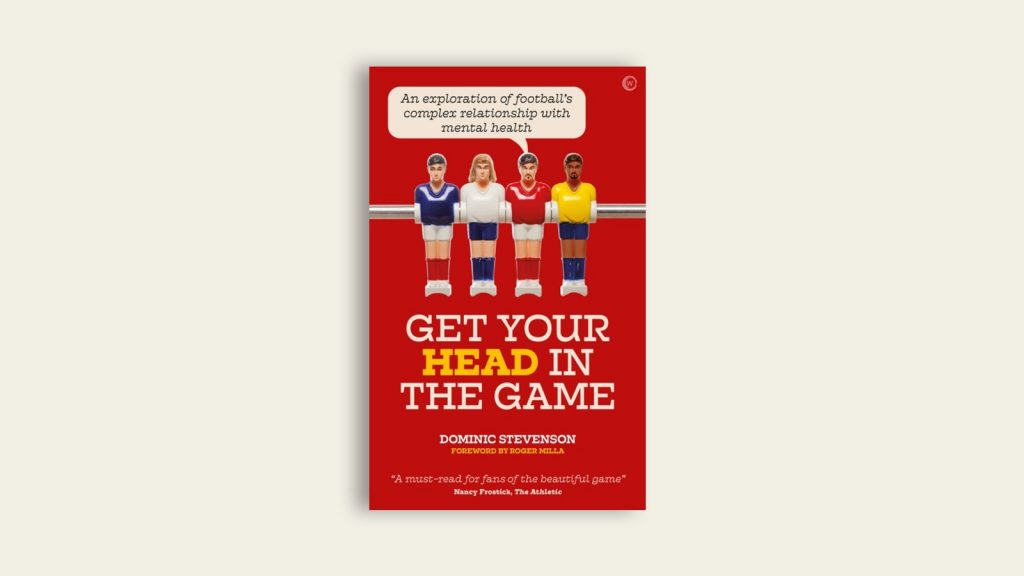
“Why should anyone be isolated while taking part in the most popular sport in the world?”
That’s a question posed by Dominic Stevenson in his book ‘Get Your Head In The Game’ – an enlightening exploration of football’s relationship with mental health.

Published in December 2020, the book is a collection of interviews interwoven with Stevenson’s astute analysis of how playing, coaching, and supporting influences the mind in a variety of ways. And as his question suggests, sometimes he learns that it can be lonely inside the game.
Problems of participation are discussed early on in the book with London Titans FC defender Jim Hearson and Hastings United Women goalkeeper Blair Hamilton, both of whom have spoken out in the media about the importance of LGBT+ inclusion in football.
The book also includes interviews with two more out women – former USA international Ella Masar and the crime writer Val McDermid (one of several celebrity Raith Rovers fans) – while ‘The Secret Footballer’ is among the other contributors to talk about the pressures that gay male professional players face.
The book, therefore, is rich in LGBT+ representation and to mark Mental Health Awareness Week, I caught up with Dominic – who grew up in Grimsby supporting Sheffield Wednesday, before later moving to live in Edinburgh – to get his take on this part of football’s big conversation…
JH: Hi Dom! Congratulations on the book, it’s such a valuable addition to this important topic for football – something we’re very passionate about at Sports Media LGBT+. Your allyship leaps off the pages. How have you arrived at that?
DS: I’m not perfect, I get things wrong, I say things in anger – but I always try to learn.
The education system I grew up in wasn’t progressive, Section 28 was only repealed in England during my final year of sixth form college. So there was a lot I didn’t know about with regards to diversity – particularly within the LGBTQIA+ community – as Grimsby didn’t have a thriving scene at the time.
I’m a product of my youth. I have positive and progressive parents who have joined me at Pride marches, they’ve travelled the world with me for football, and they’ve shown me what real humanity is – something that I was denied during my schooling.
With them paving the first steps, it’s given me the courage to go forward, to learn more, and to become a better ally.
I’ve spoken to many people in and around football over the years who are LGBT+, and our chats almost always encompass mental health. In the book, Jim Hearson says how that sense of belonging in a space that’s welcoming is a reason why inclusive clubs like the London Titans exist. The men’s game still seems to be struggling to define boundaries, and banter is often mentioned as part of that. Do you see that changing or is the tradition of how men are ‘supposed to be’ still holding football back?
I believe that slow change is happening across football already, as it is in wider society.
Because I had ‘done’ the rest of Netflix due to working from home during the pandemic, I recently found myself watching a series of Michael McIntyre’s Comedy Roadshow. This show was primetime TV for several years, and it featured some of the world’s top comedians. Yet from beginning to end there were jokes that were fatphobic, homophobic, borderline racist, and much more.
That show has since been cancelled. I’ve seen much more recent work from most of the comedians, and none of it is like that anymore.
For me, it was a small example of how society is slowly progressing, how our mainstream is becoming more embracing of diversity, and how we’re punching down less and less.

It’s difficult to maintain a positive outlook I admit, because when you turn on the news, people are screaming ‘culture war’, and when you go on Twitter, trolls are actively seeking out people to abuse. But I do believe we’re slowly getting somewhere more positive.
Football fans have an important role to play in moving society forward, and with LGBTQIA+ fan groups growing at most clubs, with women’s football leading the way with a diverse playing staff, I believe that again, the slow evolution in the men’s game is happening.
As we have more and more out gay, lesbian, bi, and trans people, football fans in generally are becoming more accepting. I believe where we are now is the ‘I don’t care what you are’ stage in the evolution. I genuinely believe most football fans wouldn’t give a damn about sexuality or gender if they could sit and have a pint with you.
The next step for me is the move to ‘ally’, where football fans will call out homophobic, biphobic, or transphobic abuse when they come across it. When that happens en masse, and not just amongst younger fans, that’s when football stadiums will be safer places for all.
I am of course saying that from a position of privilege – and I know that ‘slowly getting better’ is zero consolation to those facing abuse right now. That’s why I believe it’s more important than ever to be an active and vocal ally to the LGBTQIA+ community.
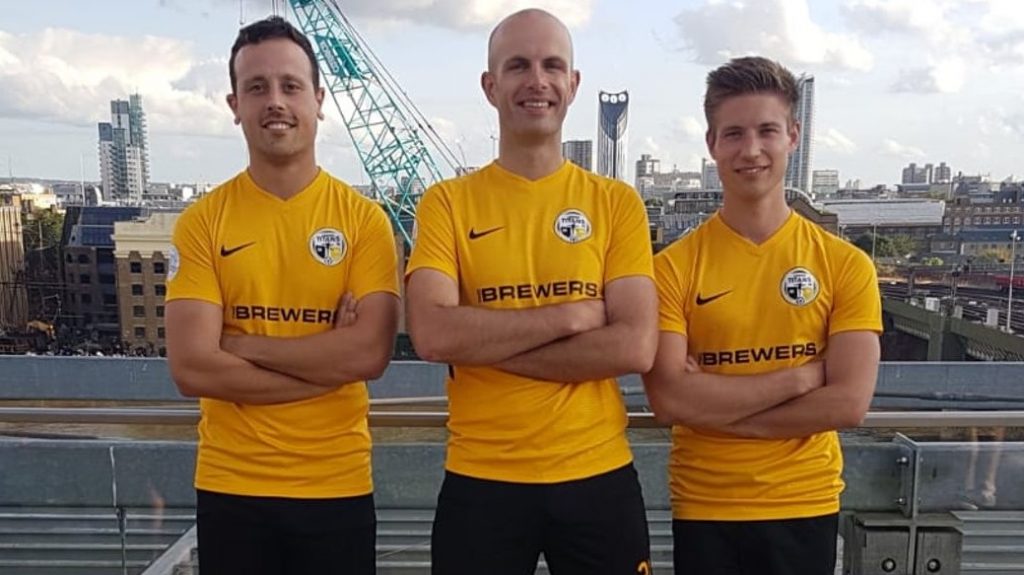
Blair Hamilton’s experiences of being a trans woman playing women’s football are encouraging but she says that as a fan, hearing anti-LGBT comments is “normal”. How do you think football is faring with regards to conversations on LGBT+ mental health specifically?
I would say that football is not engaging very well with LGBTQIA+ mental health at all. All the work I’ve seen is fan led, albeit with some clubs proactively supporting their supporter groups. But decisive action, such as blocking homophobic and transphobic fans on Twitter, ground bans, and so on isn’t happening.
The Rainbow Laces campaign is excellent, but too many football clubs are using it as a get out. They celebrate a day and call it job done – ignoring the fact that their grounds are not always safe places for the LGBTQIA+ community.
As Blair said in my book, she wouldn’t feel safe going to a football match, and for a lifelong fan and player that’s a terrible situation to be in.
While not perfect, football tries to have a zero tolerance policy to racist abuse in grounds, and this should be extended to abuse of the LGBTQIA+ community. They must also look wider to social media and be proactive allies to the community.
While being racist and xenophobic seems almost fashionable nowadays in some horrific circles, stamping down on abuse of the LGBTQIA+ community could have real success because at the minute, it’s not in the spotlight as much. No one really wants to be called homophobic or transphobic – they’ve just not been supported to understand how their ‘banter’ is harmful to others.
Many football fans won’t live in areas with vibrant LGBTQIA+ communities, they’ve had little exposure to the community, and so they understandably lack the knowledge and sometimes empathy for the abuse suffered.
Shouting at them to change will solve nothing, instead it will entrench them in hate. That’s why fans who are allies need to be loud and proud of it, we need to reach out to educate not criticise, and we need to stand with our LGBTQIA+ siblings and amplify their voices.
‘The Secret Footballer’ mentions the media’s interest in “spectacular” stories. What is your view of the media’s role in all this, having written the book? Where is good work being done, and what needs to stop?

No one buys a newspaper that says ‘footballer has a weekly therapist appointment and is doing well’. Sadly for me, I think that’s really interesting and so I tried to write a 250-page book on it!
Sometimes it feels like the media only has the ability to look at one issue at a time. That’s why there is little in-depth analysis of racism for example.
We see headlines like ‘footballer racially abused on Instagram’ but we never hear how it affects them and their families. We never hear from fans about how it makes them feel going to a football ground fearing similar abuse. We never have wider context, we just have headlines and outrage.
The only time contextual analysis comes is in the form of documentaries, but they’re so few and far between and deemed so ‘worthy’ by some, that they only preach to the converted.
We need regular analysis of issues written in a way for all to digest. Sadly though, the media outlets who could make the most difference because they reach an audience who has been left behind in the conversation are the ones least likely to do the analysis.
No newspaper or media outlet will work to normalise mental health support because at the end of the day, they’ll sell more papers, get more clicks, have more viewers, from reporting on the death of a footballer than they will one who has received appropriate support in a timely manner.
Since the book was published in December, what other stories or events have helped to grow your own understanding around mental health? Who would be on your wishlist to speak to for a possible ‘GYHITG 2’?
I have already started on my follow-up book, and this time it’s focussing on fans and club officials who are doing positive work in their communities.
My ultimate conclusion is that football is slowly getting there with mental health and it’s on the radar so much now that it can’t be ignored.
What is largely ignored though is the incredible work Wrexham are doing with disabled fans, the fantastic achievements of the Rainbow Blades in Sheffield, and the tireless campaigning of trans footballer Sammy Walker, just to name a few.
Football is a powerful tool for good, when used properly. That’s why my follow-up is going to put the spotlight on those who do good for a diverse range of people in the heart of their local communities, connected to their local football clubs.
What I discovered when writing the first book was that mental health is just one intersection of where football needs to do better in society, and I hope by writing it I have raised awareness of the successes and failures in the game.
Intersections around the LGBTQIA+ community, the disabled community, and others, haven’t ever really been explored and I am excited by the opportunity to do so.
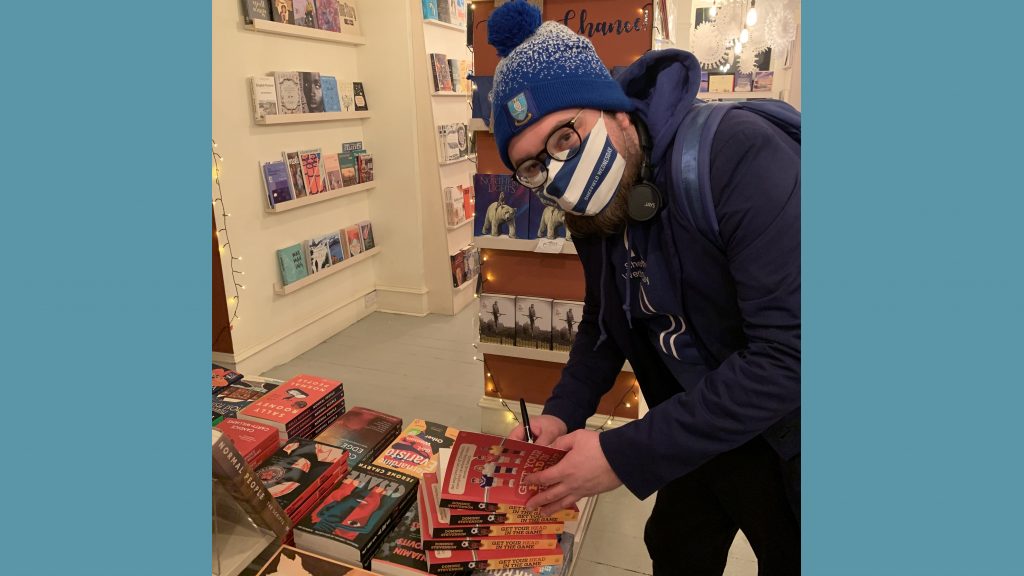
We held a ‘Creating Space’ online event on mental health in football in October. Jay Lemonius from The FA and Stonewall FC said “organisations that are bringing LGBT+ identities to the forefront of sport are doing an incredible job, but they can only go so far. There needs to be an understanding of other identities and what it’s like to be LGBT+”. What have you found educational, and what’s helped you to empathise with LGBT+ people through football?
The LGBTQIA+ football community opened its arms to me when I wrote my book, and I’m eternally grateful. I wouldn’t have been able to write the book without their buy in, their experiences, and their kindness.
The most educational thing for me was to take the time to listen. Like so many, I had an idea of what I felt the issues were, but it was just an idea. If I’d have written the book without asking the questions and listening to the answers, I would have misrepresented the community and I would never have forgiven myself.
There is no education like getting out there and speaking to people and engaging with communities. It shapes who I am as a person, and it shapes my allyship.
I hope that I am a naturally empathetic person, but even with that, I cannot speak to the experience of the LGBTQIA+ community, I can only report on it. Too many people I believe feel that having empathy means they can speak for people and in the end all that does is stifle the voices that need to be heard.
At the end of the day I’m a six foot two, hairy straight white man. I’m the most average person you could wish to meet in a football stadium and absolutely no one in 30 years has ever felt the need to abuse me. That’s why, as an ally writing about these issues, I hope I can convey my empathy and my understanding to a wider audience, to encourage them to engage themselves, and to in whatever way I can boost others within the community in their own writing and campaigning activity.
Another quote from our event, from Natalie Washington – “We need to get football in general to the idea that there’s not a template of what a footballer is like. We need to get this idea that there’s an archetypal footballer of any gender dealt with.” We recently saw a lot of transphobia online about Everton player James Rodriguez. There doesn’t seem to be much understanding at times in football of what it means to be trans, or non-binary. What needs to change before we can have responsible conversations about gender identity and mental health in football?
Sadly, I believe responsible conversations about gender identity are a long way off. However, what we can do now is keep providing a platform for trans footballers to speak, to demonstrate their skill, and to show their commitment to the game.
Doing this though puts at risk the mental health of those speaking up which is why as allies we have to advocate and campaign alongside them, we need to amplify their voices, and we need to make sure that our clubs know that their stadiums are no place for transphobia.
If as a community, and as allies, we are to make individuals our spokespeople, we have to ensure they receive appropriate mental health support. We can’t just watch people speak and then wash our hands when it gets difficult.
I would say that most fans don’t care about trans people, not in a negative way, but trans issues have just never been on their radar. This means if all they’ve ever seen is negative media coverage, they’ll have negative views. However, we can combat this by sharing positive stories, engaging others in conversation, and working with empathy to educate those who through no fault of their own aren’t aware of trans folk and how they are victimise and vilified by a screaming minority.
Bigger societal change has to happen before change in football can happen.
In Scotland where I currently live for example, we’ve seen sitting members of Parliament openly criticise the trans community for… existing. Many of their institutions are staffed by transphobes, and absolutely nothing is done about it.
When politicians can stand up, uncriticised and unpunished, and spout transphobia in the corridors of power, responsible conversations within football are a long way off.
We’ve actually seen more British sportsmen come out publicly as bisexual in the last year than have come out as gay, such as Zach Sullivan (ice hockey), Luke Strong (gymnastics), and Levi Davis (rugby union). Being bi or pan brings different challenges to being gay or lesbian, but particularly for younger generations, we’re seeing more bi visibility (or just more use of the word ‘queer’). From a mental health in football point of view, how encouraging is that and what might it suggest about an academy player potentially coming through who’s been able to be out to friends and family from a young age?
We have seen many great athletes come out, often after retirement, but more and more while they’re still competing. This bodes well for the future, but often the players in question haven’t got the media scrutiny of professional footballers.
As soon as a player at any level comes out, we all know their every move will be reported. Their first kiss, their first night out at a club, their first boyfriend, everything will be front page news. Their lives will be the role model for what newspapers want the British public to perceive a gay footballer to be. As for a bi footballer, I am not convinced this will happen for a good while yet because ultimately I don’t believe enough people understand bisexuality for an individual to feel safe.
I am positive there are many bi footballers, but (and without meaning to sound crude) if a footballer is bi then I suspect many have girlfriends now and may come out when they retire.
I hope athletes from other sports can inspire younger footballers, but youth football within academies are a hotbed of competitiveness and I don’t believe that currently they would be a place where a young footballer would feel safe coming out, however well supported they would be.
I don’t mean to be doom and gloom, and obviously the sooner it happens the better so the media and wider society can move on from waiting for the ‘first’. But if the first is 17, in an academy, and fighting for their chance to get their first contract, I would worry the added pressure would force them out of the game altogether.
I believe once it happens, football will be accepting and fans will rally round. There will be ‘banter’ and abuse, but it will be crushed because fundamentally, I believe the football community can be a very positive one.
At the minute, fans excuse their ‘banter’ because it ‘doesn’t hurt anyone’. That’s why visibility of the community and of allies is vital. Once they see their ‘banter’ hurting others, I do believe it will begin to die out.
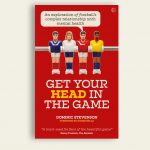
Our thanks to Dominic Stevenson. ‘Get Your Head In The Game’, published by Watkins, is available to buy now.
Follow Dominic at @HatScarfShirt on Twitter and Instagram.
Sports Media LGBT+ is a network, advocacy, and consultancy group that is helping to build a community of LGBT+ people and allies in sport. We’re also a digital publisher. Learn more about us here.
LGBT+ in sports? Your visibility will inspire other people – sharing your story can be hugely rewarding and you don’t have to be famous to make a positive and lasting impact. We encourage you to start a conversation with us, in confidence, and we’ll provide the best advice on navigating the media as part of your journey.
Email jon@sportsmedialgbt.com or send a message anonymously on our Curious Cat.